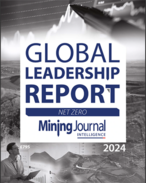This article is 5 years old. Images might not display.
In 2015 he struck an agreement to acquire the iron ore assets of Cliffs Natural Resources, which was in bankruptcy protection, in the teeth of a price slump when the price of the steel-making ore was languishing at US$40/t.
ASX and TSX-listed Champion Iron paid a paltry C$10.5 million for Cliff's mothballed operations. Today, Champion's success is reflected in a market value of A$1.2 billion after a tripling of the share price amid bullish market sentiment and growing confidence in the intrinsic merits of the business - located in Quebec's portion of the iron-rich Labrador Trough.
O'Keeffe, nominated as MNN CEO of the Year, is someone investors like to follow.
He was the man who built up Riversdale Mining in Africa before selling it to Rio Tinto at the top of the market for a whopping US$4 billion - making him a multi-millionaire and establishing his reputation as a dealmaker and mining entrepreneur par excellence. He started his career at Mount Isa Mines in Australia where he trained as a metallurgist.
Today, O'Keeffe remains president and executive chairman of Champion, having made way for David Cataford as CEO in April of this year.
He rejected the notion that to be successful in mining you have to be lucky. "You make your own luck," he told MNN in an interview this week.
"When we bought the assets from Cliffs no-one believed it could work. But I had a very good understanding of what was happening in the steel business, what was happening in high-grade iron ore; all you had to do was look and see what was happening in China.
"If you did that, you could see that all the blast furnaces were being built on the coast, which meant they wanted access to seaborn iron ore and they wanted high-grade iron ore because they wanted to compete with Japan in the high-grade market with specialty steels rather than high carbon steels."
The Chinese had to meet new environmental regulations so new blast furnaces wouldn't want to use dirty materials, he said.
In the first quarter of this year Bloom Lake produced 66.2% concentrate for $49.74 per dry tonne, which fetched a net realised price of $104.40, representing a 19.4% premium above the benchmark 62% iron ore price - demonstrating O'Keefe's thinking had been spot on.
Last year, Champion chalked up net income of US$147.6 million and had cash in the bank.
O'Keeffe has doubled down to get the cost structure right, even though the Vale dam bust, problems at Minas Rio, and strikes by miners in Labrador meant the "iron ore price spiked at the time we started to commission Bloom Lake".
"Now that was luck!" O'Keeffe admitted.
Champion will decide in the first quarter of 2020 whether to press the button on Phase 2 of Bloom Lake. The planned expansion would double output to an average of 15 million tonnes per annum of 66.2% iron in concentrate.
O'Keeffe got the company started by pumping in his own money, as well as tapping Glencore for some equity finance, and, most importantly, forging a productive and supportive relationship with the "resource-friendly" Quebec government which owns a stake of about 8%.
In May, Champion finalised a preferred share offering for C$185 million with Quebec pension fund manager Caisse de dépôt et placement du Québec. The company also secured a fully underwritten, US$200-million credit facility with Bank of Nova Scotia and Société Générale. Some of those funds will be deployed to buy Resources Québec's (RQ) 36.8% equity stake in the Bloom Lake operating company. It was O'Keefe's determination and energy that resulted in RQ, a government agency, investing in Bloom Lake in the first place, when funds were scarce in 2017.
Certainly, O'Keeffe is someone with immense business acumen, but the job is "hugely stimulating". He wanted to understand what the all-in cost was for Rio, BHP and Vale to get a tonne of 62% iron ore from Australia or Brazil into China to see whether he could compete on that basis. He took into account royalty/tax payments and even dividend pay-outs .
"Without putting too much detail into it, the best was Rio followed by BHP and then Vale, and you are talking around about US$50/t delivered into China with all-in costs."
Does he see the iron ore price coming off soon? "It's not going to happen in the immediate future. But in the next couple of years I would see it coming down, so the biggest thing for us is making sure our cost structure doesn't change."
Champion's selling and marketing agent in Japan is Sojitz Corporation, while Glencore is the agent for everywhere outside Japan.
"I am still good friends with Ivan Glasenberg. I always give Glencore first option to work with us."
Champion has become one of the Quebec province's largest landholders of highly prospective iron ore claims, with holdings located southwest of Fermont and northeast of Schefferville. It has an active exploration programme.
"I wouldn't say we're done yet," said O'Keeffe.
If he's got anything to do with it, that could be an understatement.
Michael O'Keefe has been nominated for the MNN CEO of the Year award.























